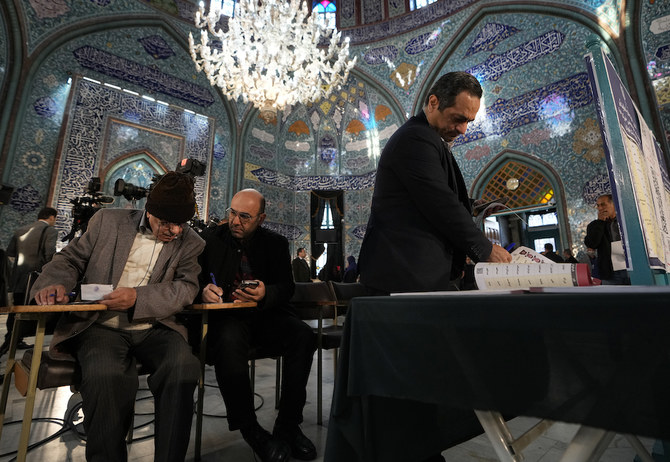DUBAI: Iranians voted for a new parliament on Friday in an election seen as a test of the clerical establishment’s legitimacy at a time of growing frustration over economic woes and restrictions on political and social freedoms.
Supreme Leader Ayatollah Ali Khamenei, who has called voting a religious duty, was the first to cast his vote in Iran.
“Vote as soon as possible ... today the eyes of Iran’s friends and ill-wishers are on the results. Make friends happy and disappoint enemies,” Khamenei said on state television. The election is the first formal measure of public opinion after anti-government protests in 2022-23 spiralled into some of the worst political turmoil since the 1979 Islamic Revolution. Iran’s rulers need a high turnout to repair their legitimacy, badly damaged by the unrest. But official surveys suggest only about 41 percent of eligible Iranians will vote. Turnout hit a record low of 42.5 percent in the 2020 parliamentary election, while about 62 percent of voters participated in 2016.
State TV, portraying a general enthusiastic mood with live coverage from across Iran interspersed with patriotic songs, aired footage of people braving snow to vote in some towns and villages. Several people told state TV that they were voting “to make the supreme leader happy.” Over 15,000 candidates were running for the 290-seat parliament. Partial results may appear on Saturday.
Activists and opposition groups were distributing the hashtags #VOTENoVote and #ElectionCircus widely on the social media platform X, arguing that a high turnout would legitimize the Islamic Republic.
Officials said the participation was “good,” state media reported, but witnesses said most polling centers in Tehran and several other cities were lightly attended. A two-hour extension of voting announced by state TV was followed shortly by another two-hour extension — taking the close of voting to 18.30 GMT — to allow late-comers to cast ballots.
“I am not voting for a regime that has restricted my social freedoms. Voting is meaningless,” said teacher Reza, 35, in the northern city of Sari. Imprisoned Nobel Peace Prize laureate Narges Mohammadi, a women’s rights advocate, has called the election a “sham.”
ECONOMIC CRISIS AND CRACKDOWN ON UNREST IN FOCUS
The parliament, dominated for over two decades by political hard-liners within the religious Islamic Republic, has negligible impact on foreign policy or a nuclear program that Iran says is peaceful but the West says is aimed at making nuclear arms — issues determined by Khamenei. With heavyweight moderates and conservatives staying out and reformists calling the election unfree and unfair, the contest is essentially among hard-liners and low-key conservatives who proclaim loyalty to Islamic revolutionary ideals. Pro-reform Iranians have painful memories of the handling of nationwide unrest sparked by the death in custody of a young Iranian-Kurdish woman in 2022, which was quelled by a violent crackdown involving mass detentions and even executions.
Economic hardships pose another challenge.
Many analysts say large numbers of Iranians no longer think the ruling clerics capable of solving an economic crisis caused by a mix of mismanagement, corruption and US sanctions — reimposed since 2018 when Washington ditched Tehran’s nuclear pact with six world powers. Efforts to revive the 2015 nuclear pact have failed. The election comes at a time of huge tension in the Middle East, as Israel fights the Iranian-backed Palestinian Islamist group Hamas in Gaza, and other groups backed by Tehran attacking ships in the Red Sea and Israeli and US targets in the region.
Khamenei has accused Iran’s “enemies” — a term he normally uses for the United States and Israel — of trying to create despair among Iranian voters.
The parliamentary election is twinned with a vote for the 88-seat Assembly of Experts, an influential body that has the task of choosing the 84-year-old Khamenei’s successor.

























